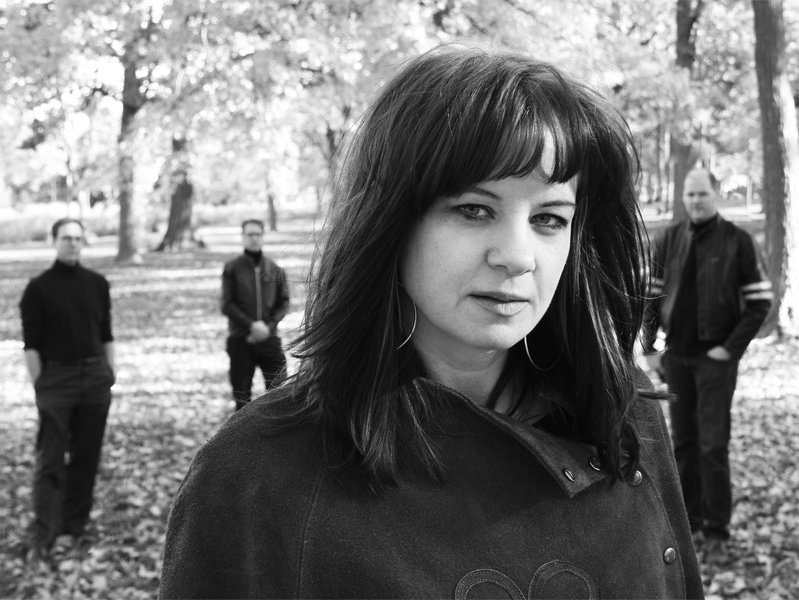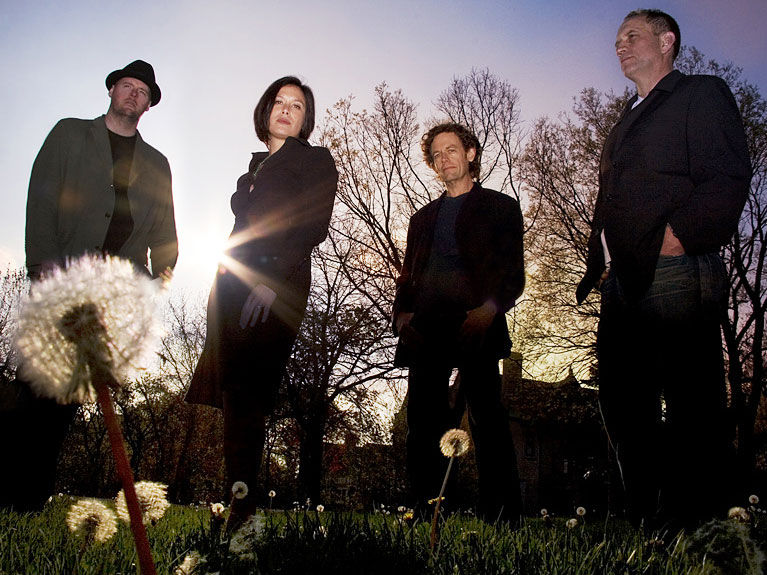Four years ago Testa Rosa -- which at that point was a trio -- released one of the best jangly pop records Milwaukee has ever gushed forth.
Four years later drummer Bill Backes has allowed Damian Strigens to focus on guitar (he also played drums on the first disc) and the band's second record is here. The good news is it's still catchy pop.
The better news is that on "Testa Rosa II" the pop is more varied and at times, well, almost symphonic. Check out the lushness of the horn-laden opener "Big Girl."
Other tracks explore new turf. "The White Cobra" has elements of folk pop and "The Black Saltwater Sea" is as dramatic as the title suggests. "My Sin" is a rock and roll ballad that shows off singer and guitarist Betty Blexrud-Strigens' distinctive voice.
Seven of the disc's 11 songs were recorded at Madison's famed -- and departed -- Smart Studios and the remainder were tracked and completed at Milwaukee's Howl Street with Call Me Lightning's Shane Hochstetler.
We talked to Damian Strigens and Betty Blexrud-Strigens about the progress of the band, working at these two studios and more.
OnMilwaukee.com: There have been some changes in the band since the first record, right? Can you tell us about that?
Damian Strigens: The main line-up is primarily the same with the addition of Bill Backes on drums. When we recorded our first album, there were only three of us so I had to tackle all of the drums and the guitars so it was nice to get a regular drummer. We had Jay Tiller (Couch Flambeau) fill in whenever he could but in the end, Bill expressed some enthusiasm and I think he really brought a nice element to the recordings.
In all honesty, the first record evolved as we were just becoming a band. I don't think we even had an actual name when we started recording it. It really just came out of a need to document some tunes that Betty had written. But this new album has been recorded over the past two years or so. We really haven't felt the need to rush anything.
Betty Blexrud-Strigens: To me, the first CD felt a little more like an experiment. I think the three of us -- Damian, Paul and I -- liked the freedom of recording multiple parts in the studio, but then when we had to play them all live, it could be a problem. I mean there are a lot of parts, and even though we were lucky to have very talented friends help us try and replicate the record, in the end it's just easier to be the type of band that the actual record can replicate.
Sounds like an easy concept, but if you are someone like me who likes to build songs in layers, or are in a band with multi-instrumentalists -- it's a challenge, logistically, to recreate that. While I still consider our primary "product" to be our recordings, and not our performance, it feels like on this album the two are more closely aligned.
OMC: (Bassist) Paul (Hancock) has written some tunes on the record, too. Did making this one feel more like a band project than maybe the first one did when it seemed more a project of Betty's and yours?
DS: Maybe a little bit. It does still feel a bit different than any other band that I've been in, in that we let things come pretty easily. We've never really been under any pressure to do what we do which is nice and makes it really enjoyable. There will be dry spells and then suddenly Betty will have three new songs and I'll come up with a few.
Yes, Paul added a few, as well. He gave me a disc about two years ago with all these little piano, bass and organ sketches -- each about a minute or so long.
One day I was listening to my iPod on shuffle and one of these pieces came up. When I saw his name on the screen I thought, "We've gotta make something out of that". When I approached him about it, he kind of had a chuckle "Oh, that? OK -- I guess I'll have to relearn it."
Betty came up with a nice vocal melody and drew up a story based on the missing moon rocks. True story.
BBS: I used to have a bigger phobia of being The Wife in the Band than I do now, but on this one I actually felt a bit freer to explore couple-hood. We even sing a duet. Regardless, we encourage each other to bring separate song ideas and have always benefited when Paul does too.
My songs get to be pretty standard verse-chorus-verse at times, but Damian and Paul bring these unexpected patterns to the table that require me to write differently. Like, I couldn't have written the vocal melody for "The White Cobra" or "Moon Rocks" on its own. Those melodies are really dictated by the guitar patterns.
DS: We began recording the first half at Smart and were about 75 percent done when we got the news of the closing. Needless to say we were really saddened by it. That studio definitely holds a special place in our hearts. Beau (Sorenson) and Mike (Zirkel) were always so comfortable to work with.
When things started to wrap up there, we realized we had about a half dozen more songs so we took four of them to Howl Street Studios with Shane Hochstetler -- another really gifted, patient engineer. Howl is about a half mile from our house and the convenience of working in Bay View was really nice.
With Shane being a drummer he has a way of micing and recording drums that is amazing. Then the remaining two songs were recorded by Beau right in our basement. He brought in a suitcase full of mics / gear, set up shop and got some great sounds. It was really perfect for those two particular songs ("Cavalier Mystere'" and "Carpet Cube"). I don't know if we would have been able to achieve sonically what we were looking for with some of the "bigger" sounding songs in our basement.
Smart had a live room with plate and spring reverbs that really suited our sound. But all in all, I don't feel that the record sounds disjointed at all. I think both producers / engineers really understood what we were trying to achieve and approached it in their own way.
BBS: Smart had really become this sort creative retreat for Testa Rosa and we were all very comfortable working with Beau. I guess if there is any silver lining with Smart closing, it was learning that it wasn't all just a fluke and that, with any luck, I could feel at home in another studio, too. Of course, like the songs, each producer has their own sound and style and we were insanely lucky to have them both nearby. Actually, I think we might be dealing with two flukes here.
OMC: Obviously, this is the second record, but why the name "II"?
DS: "Queen II," "Pretenders II," "Led Zeppelin II," "Van Halen II," "Chicago II." Perhaps we'll adopt the Chicago model and name them all numerically / chronologically. "Testa Rosa VIII." At our rate, that'll come out in 2029.
BBS: Some people might think that is pretentious, but to me it's the opposite -- more like a document; a record in the true sense of the word. A time capsule, a volume... It's like, why would anyone name a photo album? "This one is just the first one, but this second one is called.. 'Shades of Something I Want You to Think It Is'." Darn, I actually kind of like that as an album name.
OMC: How is that Testa Rosa still feels a bit like a secret even in Milwaukee? How are we gonna blow this thing up internationally?
DS: I guess we've taken a bit of a hiatus but like I said earlier, we're pretty low-pressure as far as our agenda goes. We probably don't apply as much pressure as we should when it comes to promoting, etc. I think this new record has given us all a bit of a shot in the arm. We're all itching to play again and it's exciting.
BBS: So, you haven't seen the Thule Web site yet then. We are HUGE in Sweden ... just kidding. I don't even know if blowing up is a possibility for anyone like us. Maybe we are too wise, or scared or lazy to even do what that would take -- if we could. So far licensing has been somewhat promising -- and I still do have a naive hope that if something is truly worthy, people will remember you.
Born in Brooklyn, N.Y., where he lived until he was 17, Bobby received his BA-Mass Communications from UWM in 1989 and has lived in Walker's Point, Bay View, Enderis Park, South Milwaukee and on the East Side.
He has published three non-fiction books in Italy – including one about an event in Milwaukee history, which was published in the U.S. in autumn 2010. Four more books, all about Milwaukee, have been published by The History Press.
With his most recent band, The Yell Leaders, Bobby released four LPs and had a songs featured in episodes of TV's "Party of Five" and "Dawson's Creek," and films in Japan, South America and the U.S. The Yell Leaders were named the best unsigned band in their region by VH-1 as part of its Rock Across America 1998 Tour. Most recently, the band contributed tracks to a UK vinyl/CD tribute to the Redskins and collaborated on a track with Italian novelist Enrico Remmert.
He's produced three installments of the "OMCD" series of local music compilations for OnMilwaukee.com and in 2007 produced a CD of Italian music and poetry.
In 2005, he was awarded the City of Asti's (Italy) Journalism Prize for his work focusing on that area. He has also won awards from the Milwaukee Press Club.
He has be heard on 88Nine Radio Milwaukee talking about his "Urban Spelunking" series of stories, in that station's most popular podcast.






